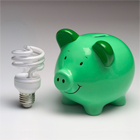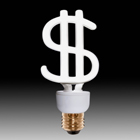Read more Oily Rag articles by Frank and Muriel Newman
The winter chill has arrived. With temperatures dropping and electricity bills rising, it’s timely to remind readers about the many ways to save electricity costs. Fortunately there is no shortage of ideas from readers.
- Tex from Christchurch says, “I save power by using a small fan-forced bench top cooker instead of the big oven. I can cook a roast meal for 4 much more economically by not heating up that massive oven most of us have in our kitchens. The small bench top oven heats faster using less power too. Slow cookers also are a great way to cook a lot of food at once inexpensively.”
- When buying new appliances, look out for the star rating sticker. This shows how much energy (in kWh hours) the appliance uses in a year. From this it is easy to calculate the annual energy cost. For example, if the sticker says 433 kWh, and energy costs say 25 cents a kWh (check your last power bill to see how much you are paying), then the annual costs will be $108.25 a year (433 x $0.25). Most appliances have a ten-year life so the life-time cost would be $1,082, which may be as much or more than the purchase price and should be taken into account when buying appliances.

Tony from Blenheim writes, “There are conflicting thoughts on if it is better to switch off appliances rather than leave them on standby. Of course it depends on the type of appliance. A TV set that’s switched on for 3 hours a day (the average time Europeans spend watching TV) and in standby mode during the remaining 21 hours uses about 40% of its energy in standby mode.”
On this theme, D.H. from Howick, writes, “Plug all of your TV, DVD, Sky, etc devices into a plug gang adaptor. When you go to bed, turn the one switch off at the wall and all those annoying power-hungry devices that would normally be on standby 24/7 will be off when you don’t want them. One flick of the switch when you want to use them will fire the whole lot up again. Say bye bye to standby!”
A freezer is most energy efficient at between -15 and -18 degrees. Keep your fridge between 2 and 4 degrees. It is most energy efficient at that level. Fridges and freezers work best when full.
Mackie from Auckland reduces hot water costs by showering with a timer. “I bought a shower timer on Trade Me for $18 and have reduced our power bill by $100 a month. We no longer have an excessive +$300 bill per month!”
Dorothy from Whangarei has a similar idea. “Teenagers just love a long hot shower and time passes quickly when you’re having fun. To encourage the family to become more economical with expensive hot water conduct family experiments to agree on the number of minutes needed for a reasonable shower. Place a windup kitchen minute timer on the bathroom window sill. If earning teenagers crave more time they could pop 50 cents in a bathroom piggy bank for a double length shower.”
- M.M says, “I take my children swimming once every week and we all wash our hair using the showers at the pools. Very rarely do we have to wash our hair at home and they never make a fuss of it like they do at home either. When I was working (before children) I always made use of the shower facilities at work and hardly ever had to shower at home!”
- Tom says, “The best power saving tip for me was rather than charging working kids board, I gave them the power bill to pay.”
- Trustpower.co.nz has a list of the ten worst power wasters. Number one on their list is homes without insulation. Number two is hot water. They say if the hot water is more than 55°C at the tap, it is too hot, and will be wasting power. If you have a consumer adjustable thermostat on your hot water cylinder it should be set at around 60°C. They also have a list of 33 Ways to Save Power that’s well worth a look.
Frank and Muriel Newman are the authors of Living off the Smell of an Oily Rag in NZ. If you have a favourite money saving or money-making tip, send it in to us so that we can share it with others. You can contact us via the oily rag website (www.oilyrag.co.nz) or write to Living off the Smell of an Oily Rag, PO Box 984, Whangarei
* Frank and Muriel Newman are the authors of Living Off the Smell of an Oily Rag in NZ. Readers can submit their oily rag tips on-line at www.oilyrag.co.nz. The book is available from bookstores and online at www.oilyrag.co.nz.








Join the Discussion
Type out your comment here:
You must be logged in to post a comment.